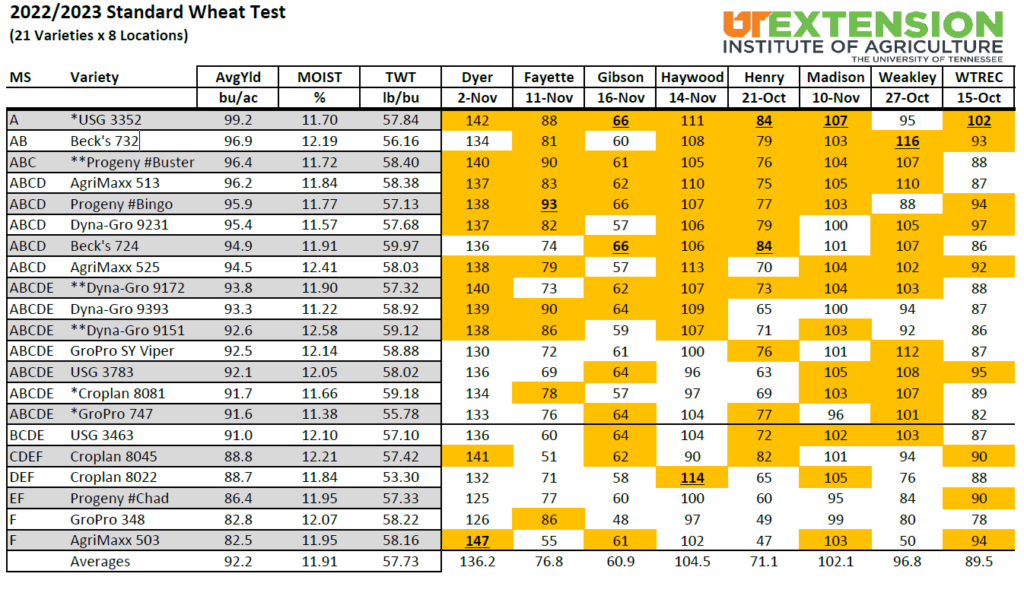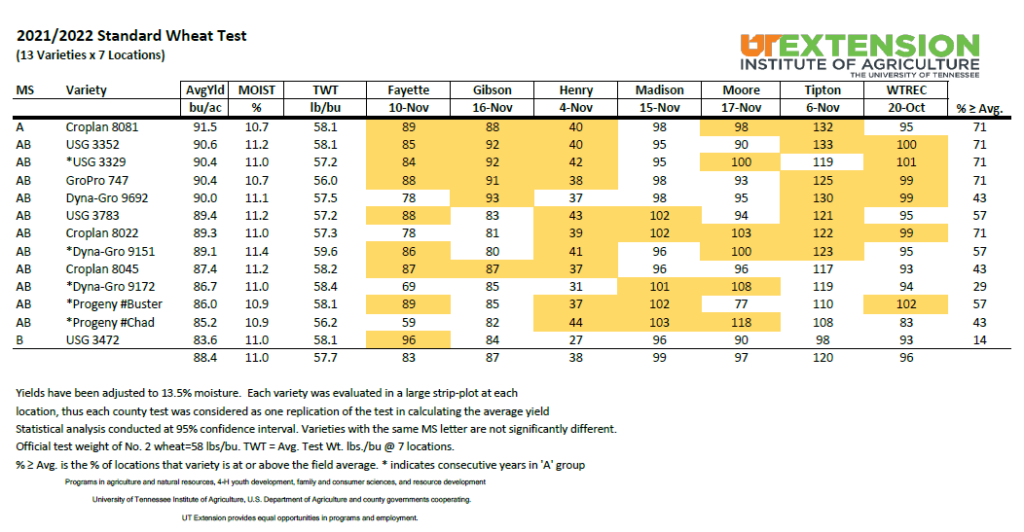The two best fall-applied options for ryegrass and poa in wheat are Anthem Flex and Zidua. Pyroxasulfone is providing the grass control in both these herbicides. Anthem Flex can be applied as a true PRE right behind the press wheel. Keep in mind there is some chance of wheat injury from this new use pattern if a rain occurs shortly after planting. As such, if rain is in the forecast wait and apply it later as a delayed PRE or early POST. Continue reading
Category Archives: Wheat
2023 Wheat Official Variety Trial Results
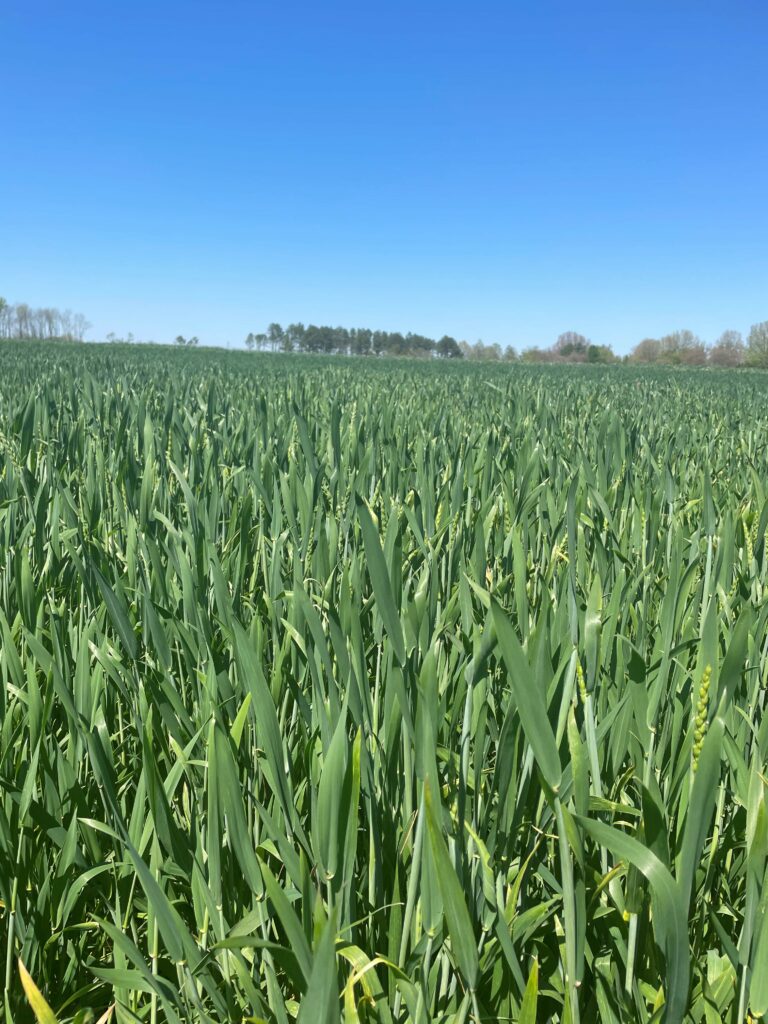
The results of the 2023 Official Variety Trials; Wheat are in. This information will be available on our variety testing site search.utcrops.com soon and can also be accessed through your local County Extension Office.
Click on the tables below to open as a PDF. You may then zoom in to better see the results.
2023 County Standardized Trials-Wheat Data
In fall of ’22, we planted 21 wheat varieties from 7 companies in 8 county trials, and the yield results in. Very good yields again this year, especially with early concerns from some delayed planting last fall combined with a wet spring and late freeze that hit much of TN. The varieties we are planting in TN are much better than what we had just a decade ago! These varieties have been selected to be more suitable to our wetter climate and our yields seem to be more stable and predictable based on management and inputs.
With our 21 varieties at 8 locations, we had an overall average of over 92 bu/ac, with location averages ranging from 136 to 61 bu/ac.
All CST’s are: on-farm, large strip trials and are managed and maintained by each county’s cooperating producer/s. Thank you to all the County Agents and growers who contributed to this data.
Click on the table below to zoom.
Little to no wheat diseases in Tennessee 2023
So far only some bacterial streak and Septoria/Stagonospora have been reported in Tennessee wheat. Continue reading
Metribuzin Injury in Wheat
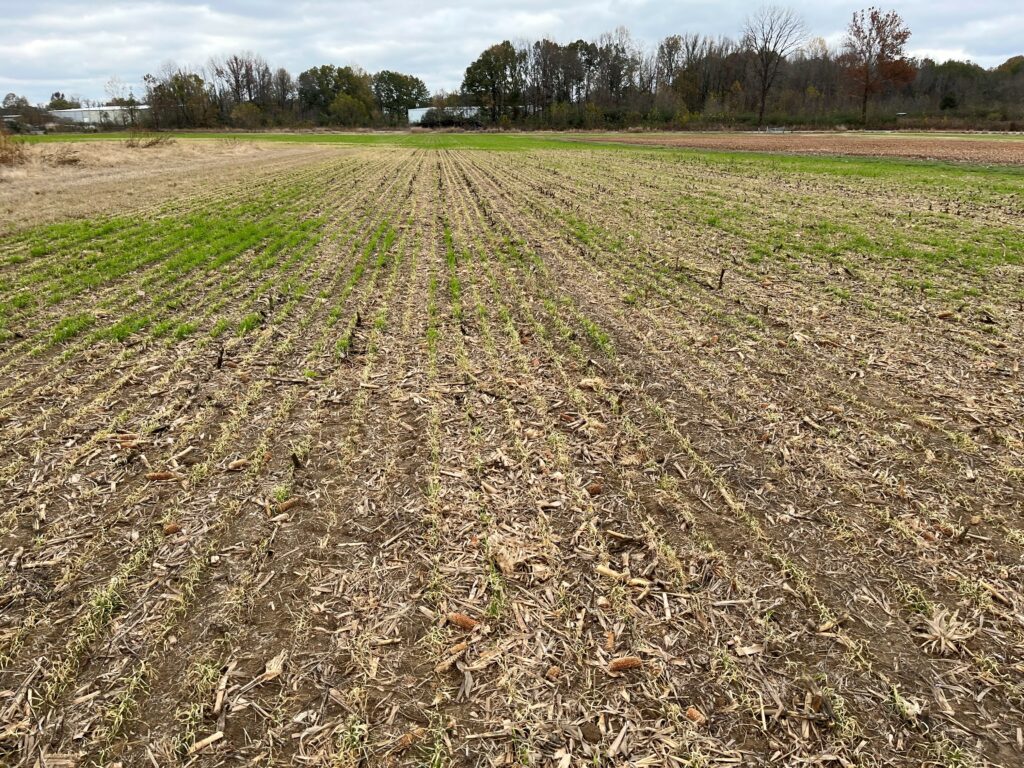
We have gotten several reports of wheat showing metribuzin injury this week. In some cases it clearly was caused by metribuzin (Picture 1). In other cases, the visual injury would suggest frost damage (Picture 2). Continue reading
Weed Management Strategies Following Early Corn Harvest that will be Planted to Wheat
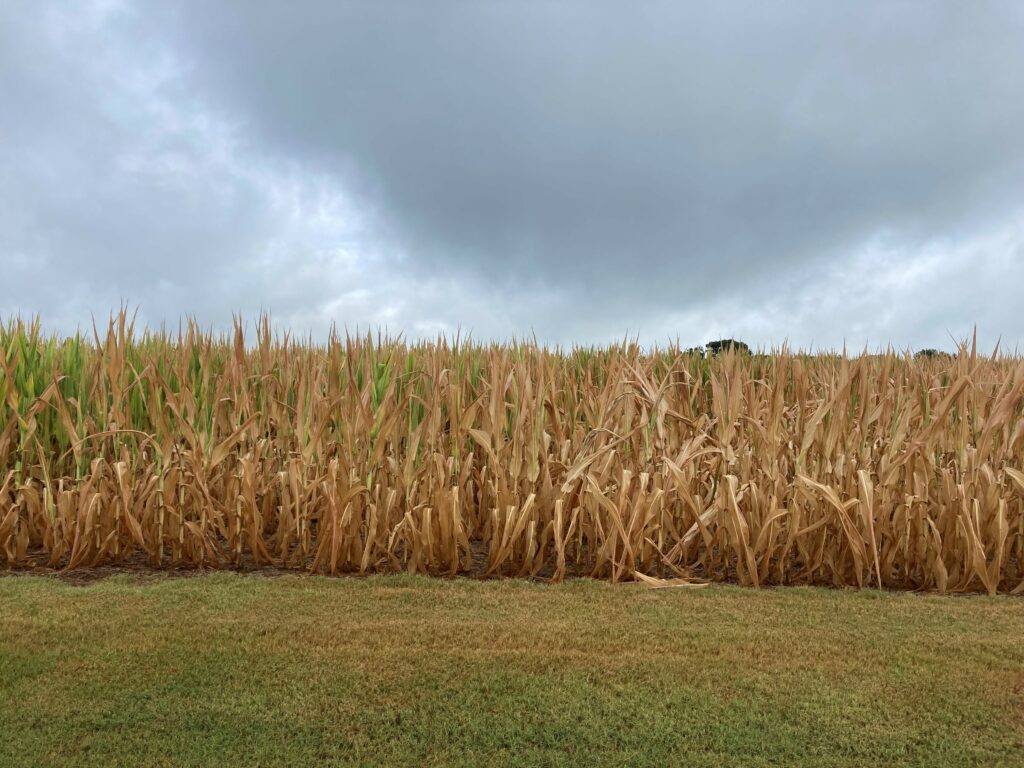
The long hot and mostly dry June and July have driven a good bit of our corn crop to premature maturity. Similar to the drought of 2012 when the corn crop burned up, I would expect a good bit of the prematurely matured corn will be harvested in August and early September. In 2012 a good bit of that early harvested corn was planted to wheat well before the fly free date. I expect many will manage this disappointing corn crop similarly this fall. Continue reading
2022 County Standardized Trials-Wheat Data
This year’s County Standardized Trials (CST) Wheat data are in. In fall of 2021, we had 7 successful wheat variety test plots planted, with 13 varieties coming from 5 industry leading seed providers. Summer 2022 harvest resulted in: locations averaged from 38 bu/ac to 120 bu/ac with an overall average across locations and varieties of 88.4 bu/ac. A full report including OVT data is available at search.utcrops.com.
click on table to enlarge
The CST program utilizes County Agents and local producers to evaluate variety performance in on-farm, large strip trials. Each trial is a minimum length of 300 feet and trials are managed using the producers’ chosen practices in accordance with UT recommendations. A special thanks to all Agents and producers involved, along with our seed industry partners!!
For more information on UT’s variety testing programs, please contact your County Extension Office.
Ryegrass and Johnsongrass: Where do we go from here?
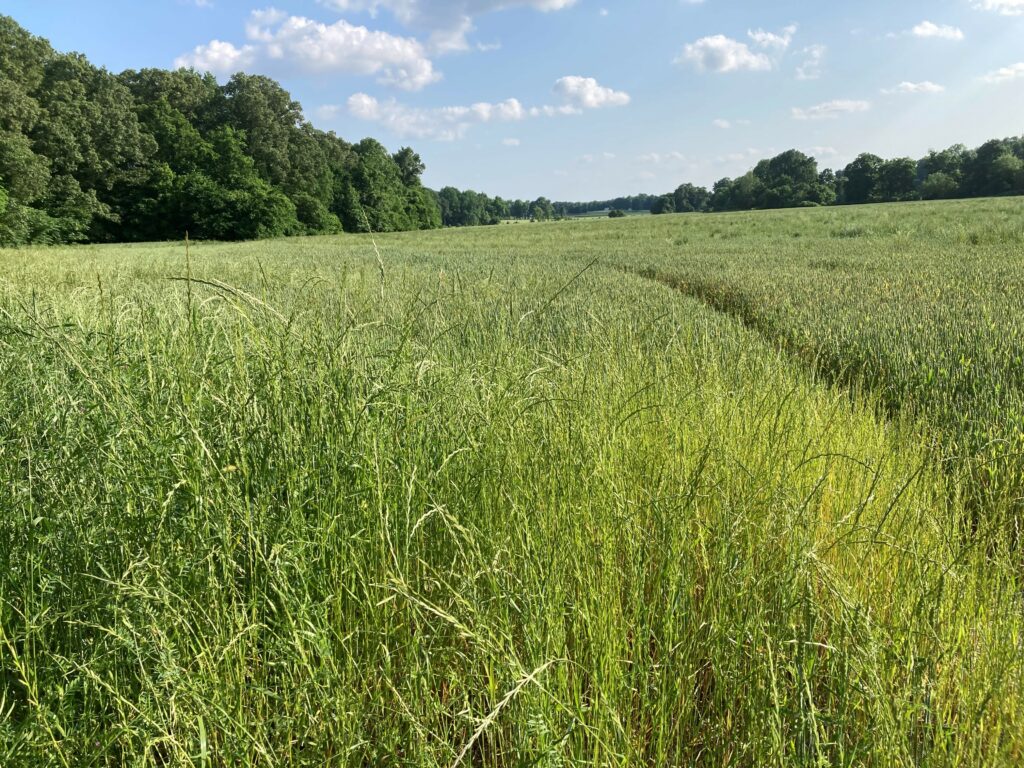
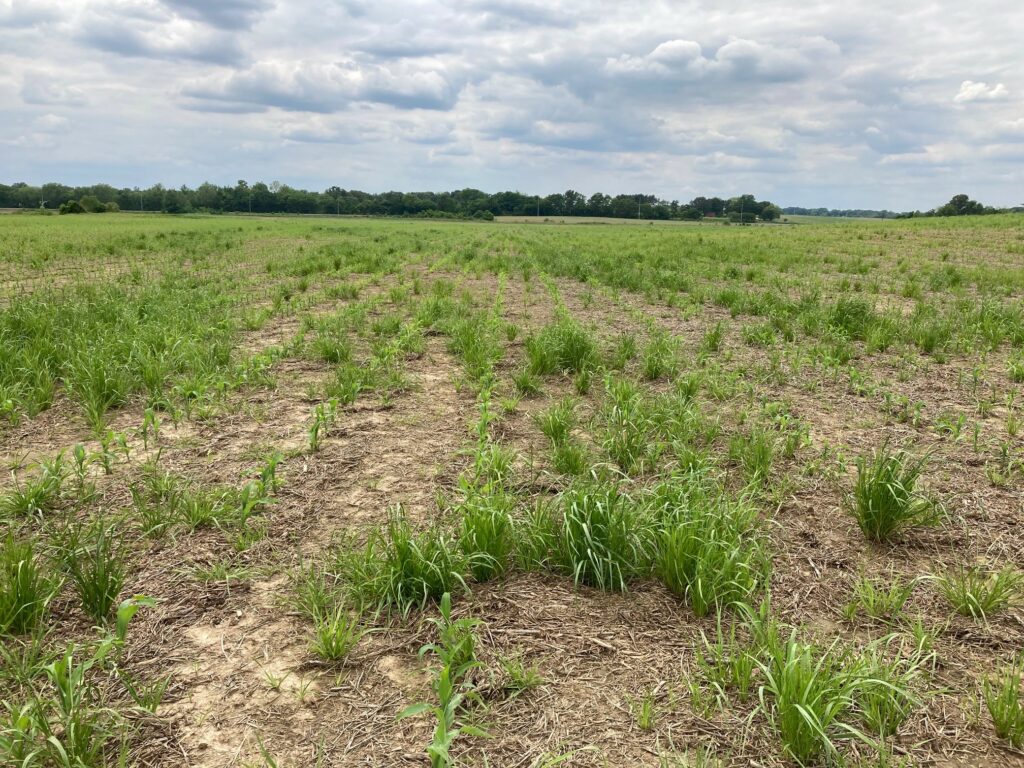
Ryegrass has moved from being an aggravation 10 years ago to a significant weed issue in our row crops. In wheat at this point, the yield loss caused by the weed has occurred (Picture 1). In cotton and soybeans, clethodim can be used now to push this weed on to maturity. In corn, there is no real solution to controlling it other than spraying the typical POST corn premix and hoping that pushes the ryegrass on to maturity (Picture 2).
The wheat fields that were consistently clean of ryegrass were those treated with either Anthem Maxx, Zidua or Axiom last fall. A good bit of the ryegrass population in the state is resistant to ALS-inhibiting herbicides which renders herbicides like Osprey, Finesse, and Powerflex harmless to ryegrass. Axial Bold has shown improved ryegrass control in spring applications over those ALS-inhibiting herbicides but it does not offer the consistent ryegrass control as those delayed PRE-applications of Anthem Maxx, Zidua or Axiom.
Johnsongrass is also a consistent problem in a good many cornfields. Glyphosate is just not providing any traction in the burndown on Johnsongrass and the POST in-crop applications are no better. Our most recent research funded by the Tennessee Corn Checkoff program has shown that Steadfast Q or Accent Q can still provide good control of Johnsongrass when glyphosate fails.


